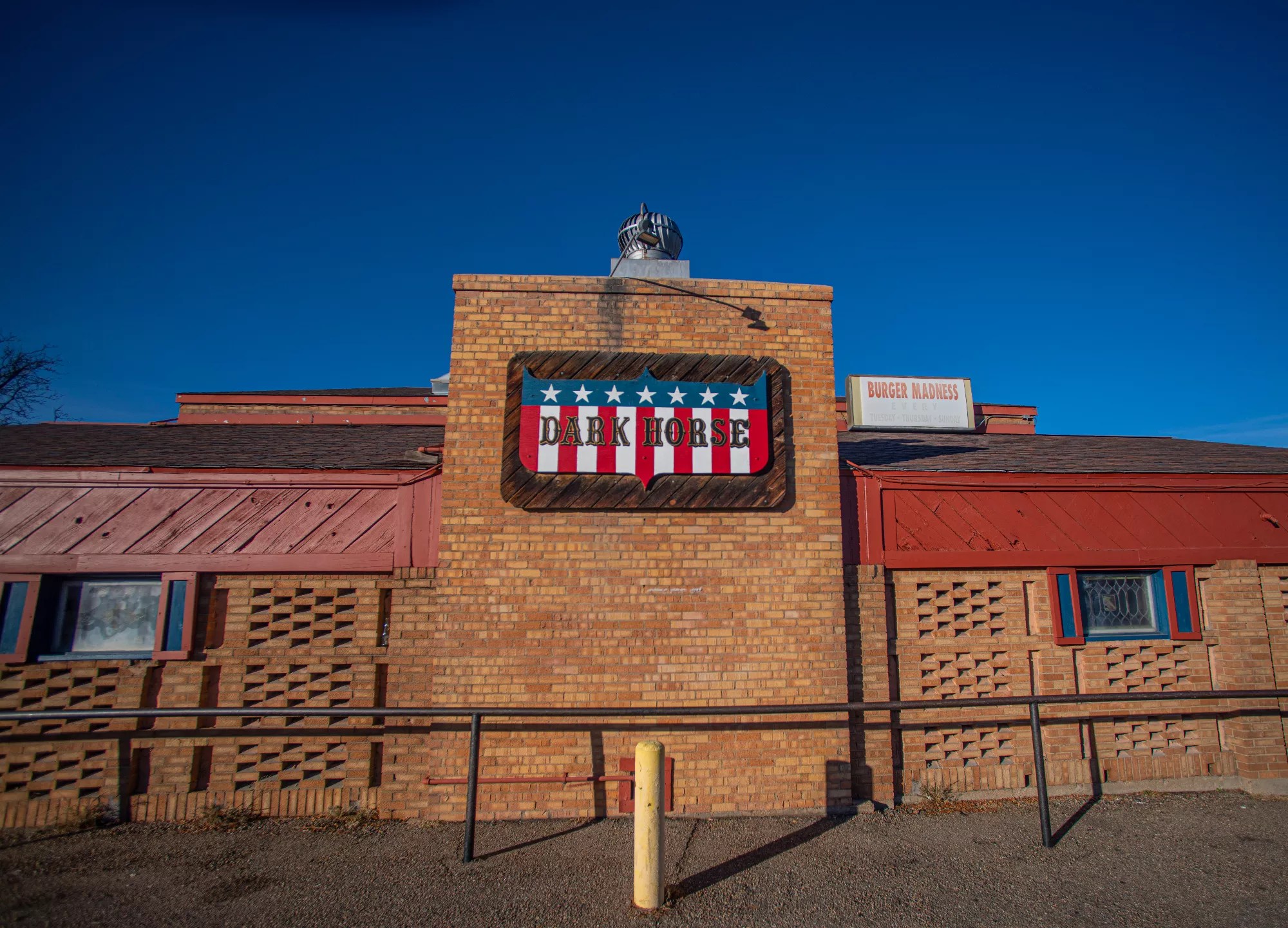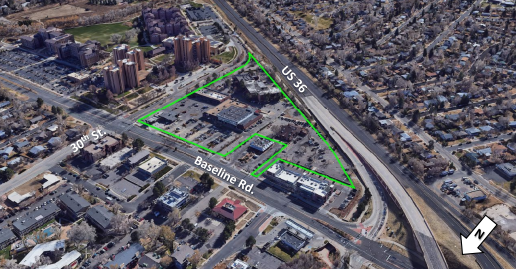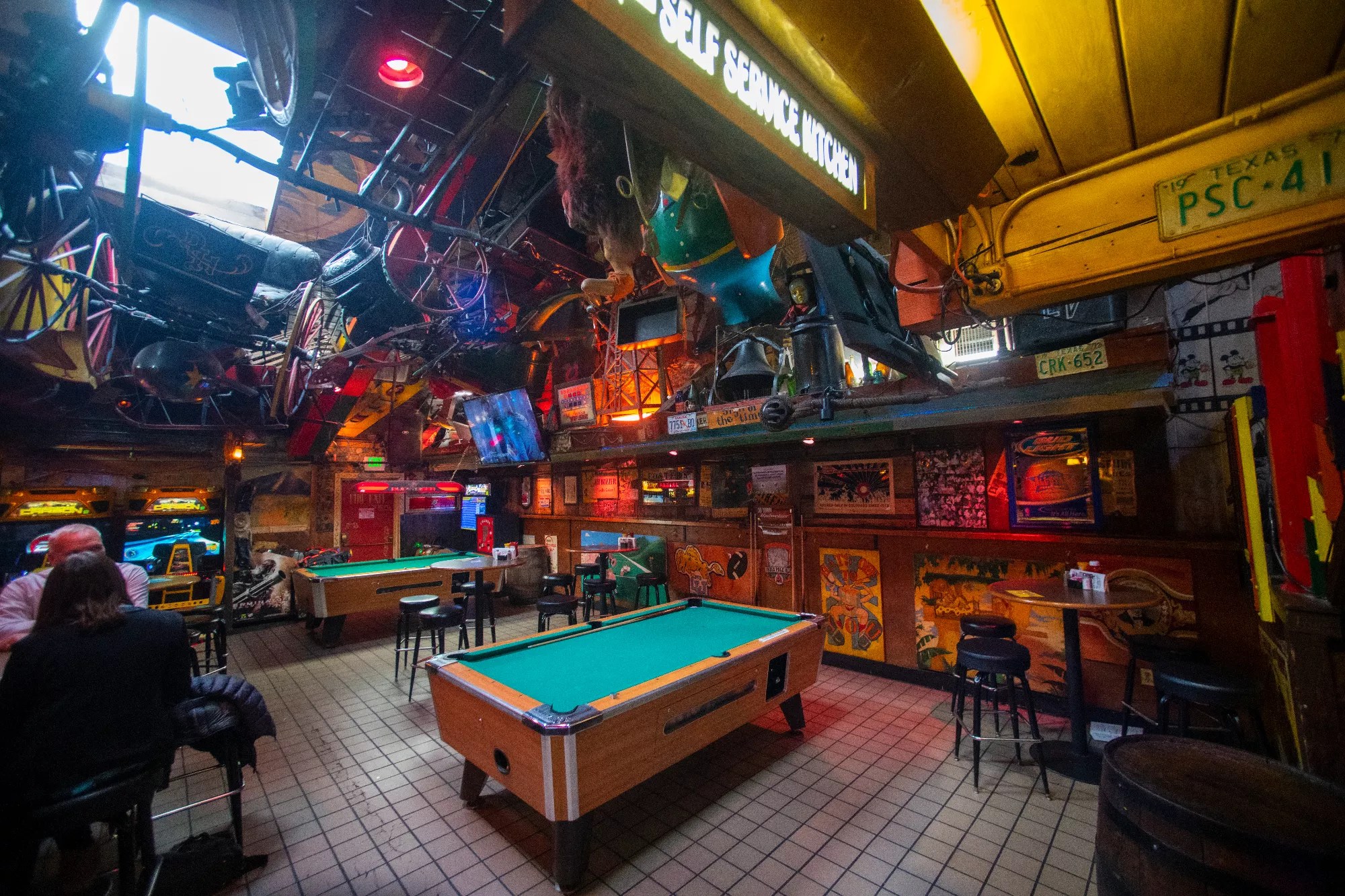
Evan Semón

Audio By Carbonatix
A plan to turn the parking lot at 2952 Baseline Road off U.S. Highway 36 in Boulder into a mixed-use development has people worried about affordability, neighborhood character and the potential closure of the legendary Dark Horse Bar & Grill, a fixture on the property for five decades.
The Boulder Planning Board held a public hearing on the concept plan for the project on January 16, and the public showed up, providing hours of statements about their desire to preserve the Dark Horse, among other issues. Lifelong Boulder resident Ana Melara-Whitman said she’s seen the destruction of Boulder’s cultural hallmarks over the years and doesn’t want this development to lead to the loss of another.
“It is one of the last remaining things in Boulder that makes me feel like it’s how it was when I was growing up,” Melara-Whitman said.
The Dark Horse is marking its fiftieth anniversary this year. Through the decades, its rooms have become packed with colorful memorabilia. Generations of fans from all walks of life have gathered there to watch Colorado’s sports teams, kick back by the fire when it’s cold – and watch out for the tricky bathroom doors.
In addition to the Dark Horse, the site currently holds a Sprouts grocery store, Carelli’s Ristorante Italiano, Cafe Mexicali, a Cosmo’s Pizza and the Boulder Broker Inn. The developers want to put in student housing and other residential buildings, 75,000 square feet of retail space, spots for restaurants and a new hotel. The land is owned by the Williams family, who donated money to the University of Colorado to help build Williams Village on the school’s campus.
The site would be known as Williams Village II. It’s currently zoned under Business-Community 2 and has a community business designation in the Boulder Comprehensive Plan. In general, that zoning indicates an area with predominantly neighborhood-serving retail and personal-service businesses.
The only building currently on the site that would remain is a McDonald’s, as it is not part of the parcel controlled by the Williams family. The developers have opted to pay cash in lieu of including affordable housing in the plan; the city will use those funds to build affordable housing elsewhere.
“One thing to note is that we have thousands of students walking through the site every day,” Bill Holicky of Coburn, the architect and planning firm on the project, told the board. “That is an energy that is hard to find, and it’s pretty cool. If we can use it to make a really functioning neighborhood, that’d be great. But right now, they’re either walking through a parking lot or across 36. It’s not a very pleasant experience.”

The site under development review.
Boulder Planning & Development
According to Holicky, the goal of the development is to make the space better for walkers and bikers and beautify what is currently mostly asphalt. The developers are proposing phased construction that would first tackle the housing projects, including those with ground-floor retail space, then move to the rest of the site’s retail elements, including the Dark Horse.
“I’ll talk about the elephant – or the Dark Horse – in the room,” said Andy Bush of Morgan Creek Ventures, a real estate development firm working on the project. “We have a memorandum of understanding that really talks about the fact that this is a forty-year relationship, and it’s been a collaborative one. … The Williams family has done more to save the Dark Horse in the last fifteen or twenty years of any group, and they’re still excited about trying to do that.”
Bush went on to say that in recent years, the family has given the bar rent discounts as it has struggled with generating business. The developers, he explained, have been looking for a way to downsize the Dark Horse and move it to a new building on the project site. Bush reiterated many times over the evening that the bar’s owners are aging and aren’t sure how long they want to keep it open, regardless of the development.
Those owners could not be reached for comment, and employees working at the bar said they have no position on the development. The public, however, had plenty to say, mostly focused on affordability and the Dark Horse, which many at the meeting said they usually find quite full.
“How many other places do you know in Boulder where you can get a burger and a beer for less than $10?” asked Guillaume Lostec, a research assistant at CU. “Please keep this place alive. Please keep it affordable.”
Many others agreed, adding that while Boulder has catered more and more to wealthier people, the Dark Horse is still accessible to everyone. Commenter Ben Herman reminded the board of other developments, like the Academy Boulder retirement community, where retail space or affordable housing was included in a later phase and then canceled because of cost overruns.
“Developers promise concessions but rarely deliver on them,” Herman said. “We stand to lose all of the restaurant space in a crucial junction in town if we let the plan proceed as is.”
He suggested that one of the student housing buildings be made smaller to preserve the Dark Horse building, and also commended the developers for certain elements of the plan, such as the two planned residential buildings with retail on the ground floor.
“Initially I was here to just talk about the Dark Horse and wanted to save the Dark Horse because I have so many amazing memories there, but after seeing this plan, I have some serious concerns in other areas,” testified Boulder resident Matthew Jensen. “If you think that an adjunct professor is going to live there, I think you’re out of your mind. I think the people that are going to end up living there are rich kids that their parents from California or Texas buy them properties.”
Others agreed, sharing current rents at Williams-owned developments to cast doubt on the affordability of the housing being built. Mark McIntyre, one of the planning board members, asked the developers if an adjunct professor at CU would be able to afford living in the market-rate units.
Holicky said he didn’t know how much adjuncts make, but that the goal is to get a broad range of people to live there.
“The idea is that there’s a strata, and that folks who have varying economic backgrounds would be able to live there,” he said. “The obvious market is CU employees, and that has been discussed a lot, so the intent would be to get CU employees in there, but it would not be accurate to say that’s 100 percent of the market-rate units.”
Resident Ken Farmer, who lives nearby, said he’s worried that the retail spaces could also be mainly high-end boutiques rather than stores that could help people. Other residents – including Lois LaCroix, who helped decorate the Dark Horse – pointed out that the development doesn’t fit with the community business zoning the area falls under.

The Dark Horse serves great food and drinks to match its one-of-a-kind decorations.
Evan Semón
“What we’ve repeatedly experienced is developers coming in, identifying BC-2 permitted and zoned land and trying to get abatements to develop it in other ways,” Brent Fontana said. “We would simply like to see those parcels developed as intended for the use of the residents. I don’t think anyone’s opposed to development. People understand the need for more housing, people understand the need for future development – but there simply doesn’t seem to be any attempt by developers to actually develop the sites as zoned.”
Several residents were concerned with the Sprouts going away, even for a time, because there aren’t other grocery stores nearby; the developers stated that Sprouts may have to close for two years during construction. People who live in the area also expressed concerns over noise.
The discussion wasn’t all negative, however. A few people spoke in favor of the development because it would eliminate an unactivated parking lot. Most comments submitted online before the hearing were in favor of the plan, noted Chandler Van Schaack, principal planner with the City of Boulder.
The boardmembers asked questions and gave feedback on technical aspects of the plan such as access roads, proper open space, building height and parking allotments. City staff had recommended considering making the development smaller in scale, and boardmembers seemed to agree.
“This isn’t human-scaled, at least not as it is,” said board chair Sarah Silver. “Please do what you can to put humans back into the overall design.”
The board also said it would need more detailed design drawings to get a better picture of the development, with McIntrye saying he understood citizens’ concern because it currently just looks like a bunch of very tall buildings coming into the area.
The developers said they’re worried about supporting more commercial uses but are open to adding more commercial space to the plan, which the board encouraged them to do, suggesting that more smaller retail spaces rather than fewer large ones might be more successful.
“I’m not opposed to redevelopment here, but I think it needs to be predominantly neighborhood-serving commercial,” boardmember Jorge Boone said. “I do not agree that retail is not profitable. It’s just the fact that what’s been proposed is the wet dream of profitability for the owners and developers of this site, and we need to step back as the planning board and look at it from a community holistic perspective.”
Boone wasn’t alone on the board in suggesting that the plan didn’t quite fit the neighborhood center designation in the Boulder Comprehensive Plan. Members ml Robles and Silver agreed with that assessment.
Boardmembers said they don’t have any say over whether the Dark Horse building is eligible for landmark designation, though it’s old enough, having been built in 1974. And even if the building were preserved, that doesn’t mean the business inside would be, they acknowledged. Some boardmembers encouraged the developers to have a more concrete solution in the final text of the plan.
The applicants will now take the feedback from the planning board and incorporate it into their proposal. Residents hope their time sitting through a very long public hearing has an impact on the plan.
“Aside from being the only bar in Boulder worth a damn, the Dark Horse has been a cornerstone of the city for decades, and is one of the few remaining icons reminding the city of its original draw of creativity and community,” said resident Aidan Young-Sgoutas. “The fact is, the Dark Horse does more for the community and student population of Boulder than exploitive student housing ever could.”